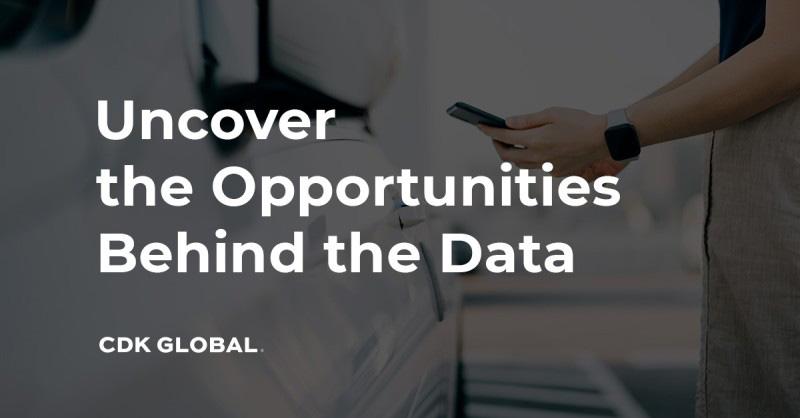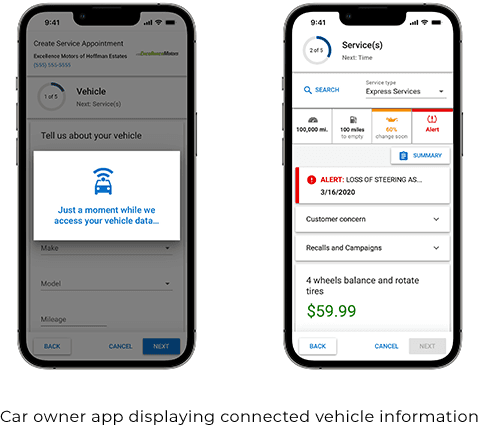4 Min Read • March 17, 2022
Connected Car Data — The Answer to Better Customer Experiences


The first generation of connected cars actually arrived decades ago. The primary purpose then was to get emergency help if we were in an accident. Over the years more options were introduced including vehicle diagnostics, monitoring driving behavior and now we can even unlock doors or start remotely from an app on our smartphone. And it’s not just luxury cars adding these features — even entry-level models come standard with connected technology.

Think of connected cars as smart devices on wheels with more than 50 sensors collecting data on things like speed, emissions, fuel consumption and usage data being sent over the internet.
These connected cars allow us to match our driving experiences to our lifestyle. We can enjoy new digital experiences, greater convenience and increased driver safety.
Our cars are closely connected to our smartphones and our smart homes. They help us lock our front door, navigate us to the next stop, call our spouse when we’re running late and alert us when it’s time for routine maintenance, bringing the connected experience into the dealership ecosystem.
Imagine how much time we’d save if our car automatically alerted the dealership of changes in its health status, and then offered us choices of the next available service appointment based on our calendar and the dealership’s scheduling app.

Or consider how much money we’d save if our dealership offered us an insurance plan tailored to our unique driving patterns and needs.
According to our newly released survey, shoppers believe that connected car technology will improve their service experience and would return to the dealership if connected services were offered.
Improving Experiences Through Connected Car Data
The entire customer journey can be made better by more personalization driven by connected vehicle data.
But data is often trapped in silos across organizations. What’s needed is an open automotive ecosystem where the exchange of data is fast, reliable and protected from a privacy perspective.
Like most industries, automotive is moving from analyzing data looking back, to looking forward using human-based and artificial intelligence (AI)-based modeling techniques to predict what might happen in the future.
This begins in the sales process. Vehicle data can be used to drive targeted marketing and sales strategies for new and used cars, based on buyer experiences such as mileage, driving patterns, and maintenance history.
We know from past research that car owners want early detection of necessary maintenance or repairs. With connected car data this is possible. The car owner, the auto manufacturer and the dealership are all alerted.
As car owners, we use this information to stay informed of things like service bulletins or recalls. The manufacturer uses the data to create incentives and build better products. Similarly, the dealership uses it to deliver exceptional customer service such as proactively ordering the right parts, scheduling the right Technician and notifying customers when it’s time to bring their car in for service.
Our Connected Vehicle survey uncovered that not only do consumers enjoy these benefits but 79% are also more likely to choose a dealership for service that provides connected capabilities.

That makes sense because as consumers, we all crave convenience. Dealerships can use vehicle data to make our lives easier. For example, dealers can see what maintenance and warranty contracts are in place and use this information to upsell tailored packages to their customers such as lifetime oil changes and other concierge services.
New Opportunities Are Here Today
The car has become a powerful information platform that not only provides better experiences for us as drivers, but also opens new possibilities for auto manufacturers, dealers and independent software vendors to create a better product for the future.
CDK is uniquely poised to maximize vehicle data and combine it with other rich data sources that seamlessly integrate into key dealer workflows to help drive better customer experiences. This acceleration in connected car technology is what led our teams at CDK to study the impact on the Service shopper. I’d like to invite you to read more on two key areas of focus:
- Connected Vehicle Technology Awareness Can Change Customer Attitudes Toward Dealerships
- Maximize Customer Interest in Connected Car Technology for Your Service Department
Our full findings and additional viewpoints can also be found in our e-book.
Sources:
- Statista Vehicle and Road Traffic Statistics
- Win Back and Keep Service Customers, a CDK research study of service shopper behavior
- CDK Connected Vehicle Research Study
Share This









